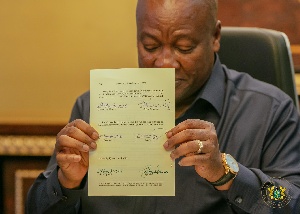Business News of Wednesday, 9 April 2025
Source: www.ghanawebbers.com
Betting Tax in Ghana: Has it been properly abolished or a legislative drafting error?
Ghana's Lottery Tax Repeal: A Closer Look
Ghana has abolished the tax on lottery winnings twice. The first instance was in 2017, and the second occurred in 2025. Both times, the process faced legislative challenges.
The recent repeal of the withholding tax on lottery winnings excited many participants. However, a legal question remains: Does this repeal eliminate all taxes on lottery winnings? Or does it only remove the withholding obligation at payout?
In 2017, the betting tax was removed under Act 956. It was reintroduced in 2023 through Act 1094. Then, in March 2025, Act 1129 repealed it again.
The key issue is whether this repeal fully abolishes the betting tax or if it's just a drafting error. Is income from betting taxed elsewhere despite being removed from investment income?
Legally, the signed repeal ends withholding taxes at payout for lottery winnings. However, there are complex considerations about overall taxability under the Income Tax Act.
Historical Context of Gambling in Ghana
Gambling has existed throughout history. In colonial Gold Coast, it included informal betting houses and underground lotteries. After independence, unregulated gambling became a significant challenge.
To address this issue, Ghana introduced two laws: The Lotteries Betting Act of 1960 and The National Weekly Lotto Act of 1961. These laws aimed to regulate gambling activities and protect citizens from unscrupulous operators.
Act 31 criminalized unauthorized lotteries while establishing state oversight over gaming activities. Recognizing potential revenue from well-managed lotteries led to creating a state monopoly with Act 94.
Over time, additional regulations were enacted to modernize gambling laws. This included reforms that established the National Lottery Authority (NLA) to manage national lotto operations.
Taxation of Lottery and Gambling Income
Under Ghana’s Income Tax Act of 2015 (Act 896), taxable income falls into three categories: Employment income, Business income, and Investment income. Each category is defined distinctly for taxation purposes.
Employment income includes salaries and benefits from employment relationships. Business income covers profits from trades or professions. Investment income includes returns from assets like dividends and lottery winnings.
Since 2015, Ghana has classified lottery winnings as investment income subject to tax. Countries with worldwide tax systems generally tax gambling winnings as either occasional transactions or business-related incomes.
Lottery winnings were initially taxed at a withholding rate of 5%. In 2016, an amendment exempted up to GHS 2,592; excess amounts were taxed at that rate again.
In response to stakeholder engagements starting in 2021, a new tax structure was proposed in the Budget Statement for 2023. This included replacing Corporate Income Tax with a Gross Gaming Revenue tax and introducing a token withholding tax on winnings.
Reintroduction of Withholding Tax
The Income Tax (Amendment) Act of 2023 reintroduced a withholding tax of 10% on lottery winnings after consultations concluded in early January that year.
Withholding taxes are efficient for collecting taxes directly at source. This method ensures compliance with tax laws while reducing administrative burdens for taxpayers and authorities alike.
In many jurisdictions like Ghana, this system operates as final withholding taxes—meaning no further filing obligations exist for recipients regarding those incomes.
Repeal of Withholding Tax in 2025
The Budget Statement for 2025 announced plans to abolish the withholding tax on lottery winnings again through Act 1129. This act amended Section 6 of Act896 by excluding lottery winnings from taxable investment items.
However, questions remain about whether this repeal effectively exempts all betting-related incomes from taxation altogether due to potential drafting issues within previous legislation amendments made since then.
From a policy perspective, an income can be either taxable or exempt but not both simultaneously under current law definitions outlined previously mentioned sections within Acts passed over time concerning taxation matters related specifically towards lotteries/gambling activities conducted within Ghanaian borders today still ongoing today too!
If not classified as investment income anymore nor exempted under other sections mentioned earlier—what then defines such winning amounts received by individuals participating regularly?
While repealing withholding obligations may seem beneficial—it doesn’t automatically mean these earnings won’t face scrutiny when determining their nature based upon existing definitions provided earlier regarding what constitutes “business” versus “isolated transactions.”
Thus even though winners might escape immediate deductions taken upfront—they could still find themselves liable later down line depending upon how often they engage actively within these types ventures moving forward!
Conclusion
Parliament must clarify distinctions between abolishing withholding taxes versus exempting underlying incomes entirely! Unless specific exemptions appear explicitly stated within repealing legislation itself—lottery wins remain taxable per existing provisions outlined previously discussed here today!
Winners must declare any applicable taxes owed according current laws; failure risks accusations surrounding evasion charges potentially arising thereafter too! Therefore careful examination needed ensure clarity exists around intentions behind recent changes made recently concerning taxation policies governing lotteries/gambling sectors alike across nation-wide landscape currently evolving rapidly now more than ever before!
Questions linger about professional gamblers’ status—is their engagement considered exempt? What happens when someone hits big jackpots? How do promotional wins factor into all this?
By Francis Timore Boi Esq
[[email protected]]
Tax Consultant & Member
Chartered Institute of Taxation Ghana











